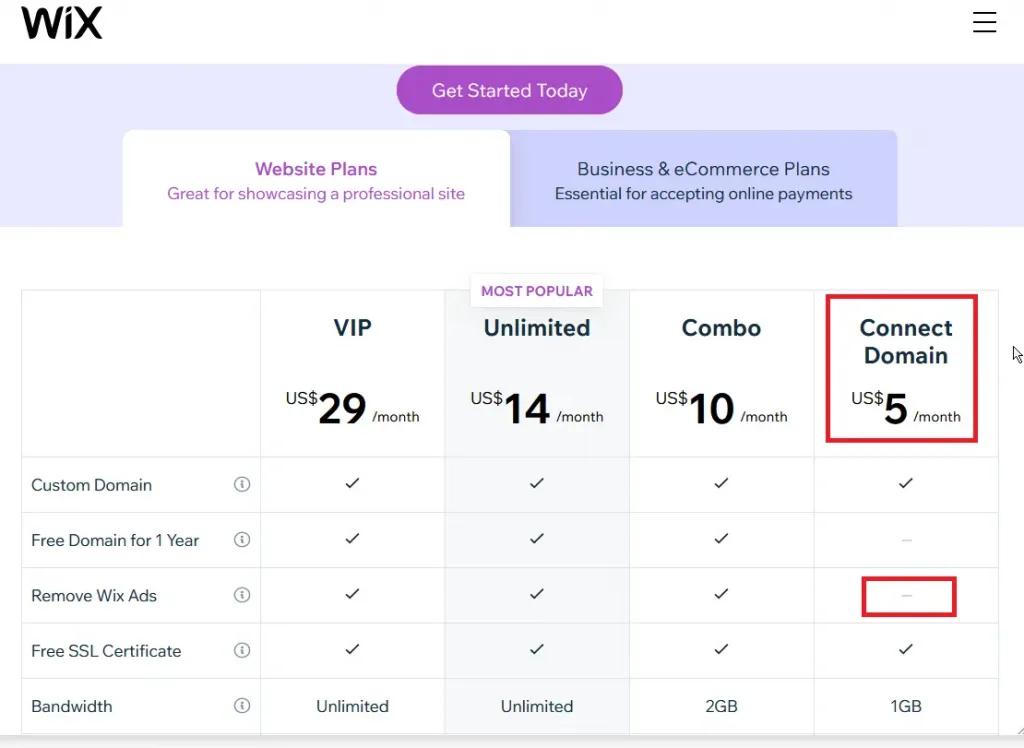There’s no question of why we need web hosting. If you’re starting a website for the first time, you might be considering Wix – a website builder that allows you to create a new site in just a few clicks. The main features are ease of use, as you can start building website components without any coding knowledge and can implement functionality like scheduling with ease. However, all these benefits come with a serious downside – namely flexibility. Once your website is hosting with Wix, there’s no way to migrate out of it. Wix is bad for your site.
In addition, it’s not future proof. In this article, I’ll show you why Wix is a bad idea to host your site compared to solutions like WordPress.
Table of Contents
1. You Shouldn’t Use Wix Because of Ads
I think it’s scandalous that Wix uses your site to serve advertisements even if you’re on a paid plan. Here’s a screenshot of their pricing system. You can see that you pay $5/m to add your custom domain, but they still server their ads on your site:

It’s a total rip off. You can get cheaper hosting with your own domain and have a site that respects your privacy, and that of your customers. After all, are you trying to promote your own product or someone else’s?
2. Wix is Not Future Proof or Open Source
One of the biggest worries with a platform like Wix is that you don’t know if they’re going to be around 20 years later. A business is a long-term project, and as time goes by, your website becomes more and more entrenched. So you need to base it on technologies that will remain with you forever.
Wix is a private company, and its code is not open source. What this means is that if they go out of business one day, your website is done for. You can’t migrate it to any other platform because their code isn’t open source, and no one can develop migration tools. Open source platforms like WordPress don’t have this problem, because even if the parent company – Automattic – goes under, the project will be picked up by someone else.
In general, always be wary of closed source technologies. If you want to build your business on a solid base, ensure continuity.
3. Wix Holds you Hostage to Price Increases
Once you build your website and host it on Wix, you’re stuck there. When they decide to increase their prices, you can’t migrate out of the platform due to its proprietary nature. Websites tend to have a lot of inertia. You tend to remain on the same web hosting platform for a long time. There are high switching costs in terms of effort.
But at least with something like WordPress, you have the option to switch. If need be, you can move your website to another hosting provider. With Wix, you can’t do either of these things. You’re stuck on their hosting service, using their software. So you can be squeezed any which way at the whim of the company. You’re locked in – and that’s never a good long-term strategy for a business website.
There are plenty of affordable web hosting options – cost shouldn’t be a reason to choose Wix over normal web hosting.
4. Wix Has No Security Audits and is Closed Source
Another disadvantage of a closed source software model is that no one really knows about how secure it is. The code isn’t available for auditing, so we can’t tell if it uses best practices, or whether it’s vulnerable to certain attacks. One might argue that this hinders attackers as well, but that’s a very flimsy kind of security. Worst case scenario, it means that insiders will be able to exploit vulnerabilities without consequences.
Something like WordPress on the other hand, is always under the microscope. Its code is checked and rechecked with every update. Large companies rely on WordPress for their backend, and they conduct their own audits. Every line is debated, discussed, and thought about by the global developer community. As a result, it’s rock-solid, and if you follow best practices, you can be more or less assured of a vulnerability free installation.
5. Wix Has Limited Plugins and Flexibility
While Wix comes with its own easy functionality, it simply can’t match up to the tens of thousands of plugins developed for an open-source project like WordPress. And you can’t develop your own plugins either if the in-built ones don’t give you what you want. Neither can you hire someone to build it.
So you’re pretty much stuck with what they give you out of the box. End result – it’s difficult to build a website that’s unusual, or has special requirements. As your site grows, you’ll come to appreciate all the little things that help it stand out. With Wix, it’s going to be more or less cookie cutter.
6. No Wix Migration Tools
Obviously Wix wants to lock you into their ecosystem, not give you a way out! So migration to another platform is painful. Most people do it manually – hopefully before they’ve committed themselves to creating dozens or even hundreds of pages. Manual migration involves painstakingly copy/pasting your images and content into your new CMS.
There are some paid services like cms2cms.com that will migrate your site for a fee. It’s annoying, but might be necessary.
Wix vs WordPress: Why WordPress is Better
It’s easy to get caught in the hype of new technologies and wonder whether sticking with something that’s been around for decades is a good idea. But the reality is that WordPress is more relevant than ever. Especially with its latest updates.
There are plenty of WordPress alternatives in the market, and recently, some have begun to question whether it’s time for WordPress to “stand down”, so to speak. They point to a number of issues with the platform, including an obsolete code base, lots of relics for extended backward compatibility, and opaque documentation.
A lot of these criticisms are valid. WordPress has become so ubiquitous over the years, that the developers spend a lot of effort making it backward compatible for everyone. But despite all this, my prediction is that WordPress is going to outlast all its competitors in the market.
Neomania – New Isn’t Always Better
I’ve had occasion to mention my fondness for Nassim Nicholas Taleb’s ideas on “Antifragile” systems. One of the concepts is the fallacy of thinking “What’s new is better”. Whereas in many ways, the opposite is true. This is called the “Lindy” effect, where the longer an entity exists, the higher the probability that it will continue to exist.
Systems that survive longer in competitive environments are more likely to survive even longer. Examples are classic literature, evolution, and all kinds of habits and customs that have stood the test of time.
Based on this insight, I foresee that WordPress stands the highest chance of outliving its competition. It’s been around for an eternity in a fast-paced time frame, has withstood the attacks of many new technological developments, and has thrived in a word where web design is fluid, and where trends are constantly in flux.
Here are a few reasons why I think WordPress isn’t obsolete.
1. It’s Backed by a Profitable Parent Company
WordPress’s parent company Automattic is in charge of coordinating the project’s direction and growth. While WordPress itself is free, Automattic earns revenue in many different ways – via the premium services of the JetPack plugin for instance.
Open source projects that are backed by profitable entities are much more likely to thrive compared to those which are purely volunteer-driven. Take CentOS derived from RedHat, or MySQL led by Oracle (and previously by Sun Microsystems). These are all hugely popular and successful open source projects, guided by profitable companies.
Contrast this with other open-source projects like Joomla! – a competitor to WordPress. Unlike the latter, Joomla! is a purely volunteer-driven enterprise, which means they lack the resources to invest as much care and effort into their CMS. And it shows. I have only a little experience with Joomla!, but from what I saw, it’s nowhere near as easy to use and streamlined as WordPress.
However, Wix too is a profitable company. But here are the other benefits over Wix.
2. WordPress Isn’t Afraid to Shake Things Ups
One of the hallmarks of a long-term, viable project, is the willingness to experiment and make bold new changes. WordPress’s Gutenberg update completely revamped the editor. A lot of people didn’t like it at first. Heck, I didn’t like it at first! But since then, I’ve come to see its value, and they’ve ironed out a lot of the wrinkles that plagued it when it was released. It’s not much more polished and delivers a cleaner editing experience compared to the older TinyMCE editor.
Examples like this give me hope that WordPress is here to stay, and that they’re willing to re-invent themselves if necessary, to stay relevant.
3. It’s Open Source
Many of WordPress’s competitors like Wix are closed services. I’d written earlier about why it’s a bad idea to use Wix with your website, and the fact that they don’t disclose the code is a major reason. No one can audit it for security purposes, and if the parent company shuts down, there’s no way to carry it forward, since the codebase is hidden.
The real world has shown us that large open-source community projects spearheaded by a profitable parent company are a sustainable business model. And if the parent company is profitable, there’s good reason to place bets on the long-term survivability of the projects under its wing.
Wix on the other hand, is closes source by design. While they give you a sandbox to play in, there are many things you simply can’t modify.
4. Unmatched Community Plugins and Themes
WordPress’s true power comes from the community. With millions of people running WordPress, their plugin database is massive. If you have a problem, chances are that someone else has the same problem, and has written a plugin. For example, I myself wrote a WordPress plugin that calculates values within a shortcode. I use it on this site WP-Tweaks, and lots of people have benefited from it.
Wix on the other hand, is just one company. They can’t make everything, and they can’t solve every problem. They can address some of the big issues, but not the long-tail. And web design is a very long tailed profession. Every site is unique. WordPress has the tools for customization. Wix doesn’t.
5. WordPress is Far from Obsolete
For these reasons, I predict that WordPress is going to stick around far longer than any of its competitors. Yes, you can complain that the code is messy, and that they try too hard for backward compatibility. But it works, and works well. In Taleb’s words, it’s Antifragile. Obsolete? No.
Bottom Line
Website builders like Wix have a clear benefit – they allow a complete novice to set up a professional-looking site with in-built functionality out of the box. And that’s useful. However, you shouldn’t use Wix as a long-term solution. And if you’re thinking of starting a website or a blog that you intend to run for years, don’t choose Wix. Stick with something that’s future proof instead.

Speak Your Mind